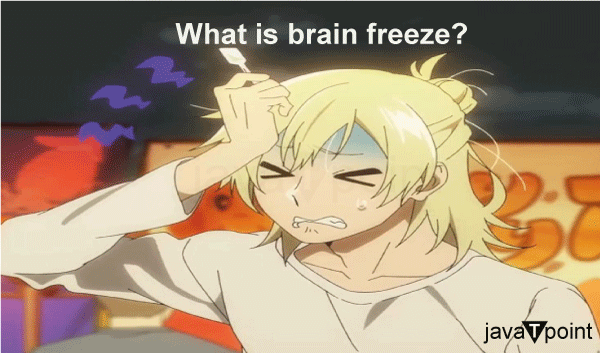Brain FreezeAn excruciating headache known as an ice cream headache or brain freeze is brought on by cold food or drink. It isn't dangerous and passes in a few seconds or minutes. If you experience one, make an effort to return your throat and tongue temperature to normal. 
A Brain FreezeA brain freeze causes a transient but severe headache near the front of your skull. It happens when you consume, inhale, or breathe something that is really cold, like: Freezing air, Icy or mushy beverages, Icy dessert, Cubes of ice, Popsicles made out of ice. A brain freeze is sometimes referred to as an ice cream headache, a headache brought on by the cold, or a headache stimulated by the cold. Sphenopalatine ganglioneuralgia is the medical word for the condition. Who is Susceptible to Suffering from Ice Cream Headaches/Brain Freeze?Brain freezes can happen to everyone. Children might be more susceptible to brain freeze since they haven't yet learnt to take their time when enjoying a treat like an ice pop. According to certain studies, those who experience migraine headaches are more likely to experience sphenopalatine ganglioneuralgia. What Distinguishes Brain Freeze from other types of Headaches?A brain freeze is different from other headaches in that it passes rapidly. The typical duration is between a few seconds and two minutes. Without treatment or relaxation, it goes gone on its own. Other headaches may manifest as different symptoms. For instance, a migraine can cause nausea, which makes you feel sick to your stomach. Some headaches might make it difficult to endure loud noise or bright light. There are no other symptoms associated with a brain freeze. Control and Treatment
What causes Brain Freezes?Brain freeze as a form of headache even though the discomfort normally subsides quickly (in a few seconds to less than five minutes). This condition, more often known as a "ice-cream headache," happens when the roof of your mouth suddenly becomes extremely cold, such as when you're drinking a slushie or biting into a snow cone. The blood vessels in the area contract and then relax as a means of retaining the heat that is still present. This causes a sharp increase in blood flow, which sets off pain signals. Why is your forehead finally more painful than your mouth's roof? There are several theories, but the trigeminal nerve, one of your brain's most intricate nerves, is the subject of the most well-known of these. This nerve, which among other things regulates sensation, including pain, in your face, is believed to be triggered by brain freeze. You experience brain freeze symptoms in your forehead and temples rather than your mouth due to a phenomenon known as "referred pain." Stay Up to DateAccording to estimates, 40% of persons are vulnerable to brain freeze. It may be a sign that some people have a more sensitive trigeminal nerve than others, though researchers are unsure of why. According to the NIH, people who get migraines are more prone to brain freeze. How to halt Brain Freeze?Treatment for a brain freeze is as simple as warming your lips back up, unlike other types of headaches that persist longer and typically call for medicine or other treatments. Furthermore, even though it hurts, a brain freeze is completely innocuous and is not something you should tell your doctor about. If you want to avoid brain freeze altogether, your best option is to eat cold meals slowly and in little pieces or sips. The temptation to gulp down a slushie or bite into a popsicle as soon as you get them in your hands is strong, though. You could attempt the following if you start to get brain freeze: Remove any cold food or liquid from your mouth, drink some warm water, your tongue should be pressed firmly on the roof of your mouth. Doctor's NoteFor a brain freeze, no medical intervention is required. Conversely, if you experience persistent headaches on a regular basis, see your doctor. Although a brain freeze can hurt, it is not dangerous and passes rapidly on its own. Avoiding extremely cold foods, beverages, and chilly air will help you avoid getting ice cream headaches. Try pressing your thumb or tongue against the roof of your mouth if you get a brain freeze. Alternately, sip on something warm or at room temperature.
Next TopicBrain Mapping
|
 For Videos Join Our Youtube Channel: Join Now
For Videos Join Our Youtube Channel: Join Now
Feedback
- Send your Feedback to [email protected]
Help Others, Please Share









